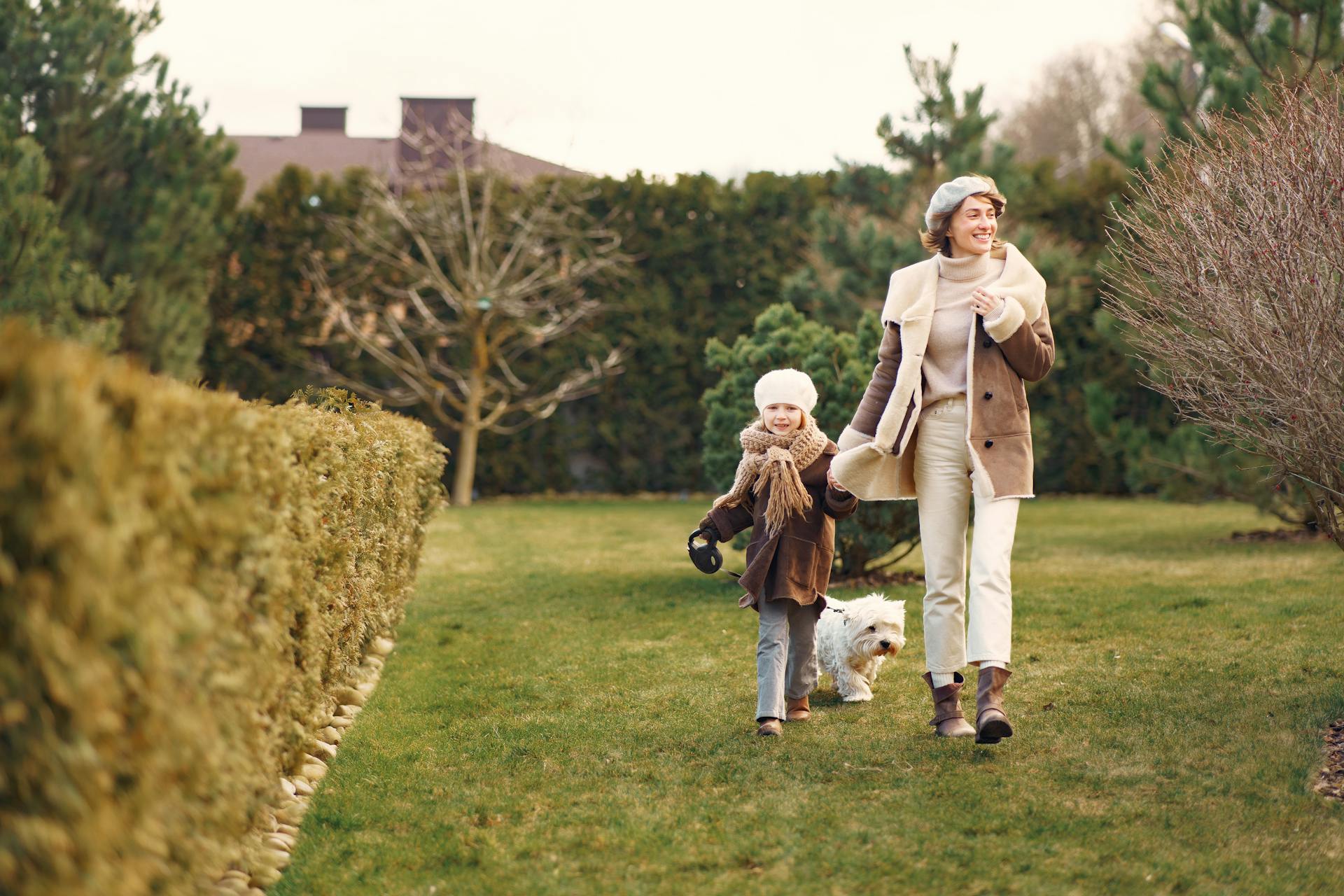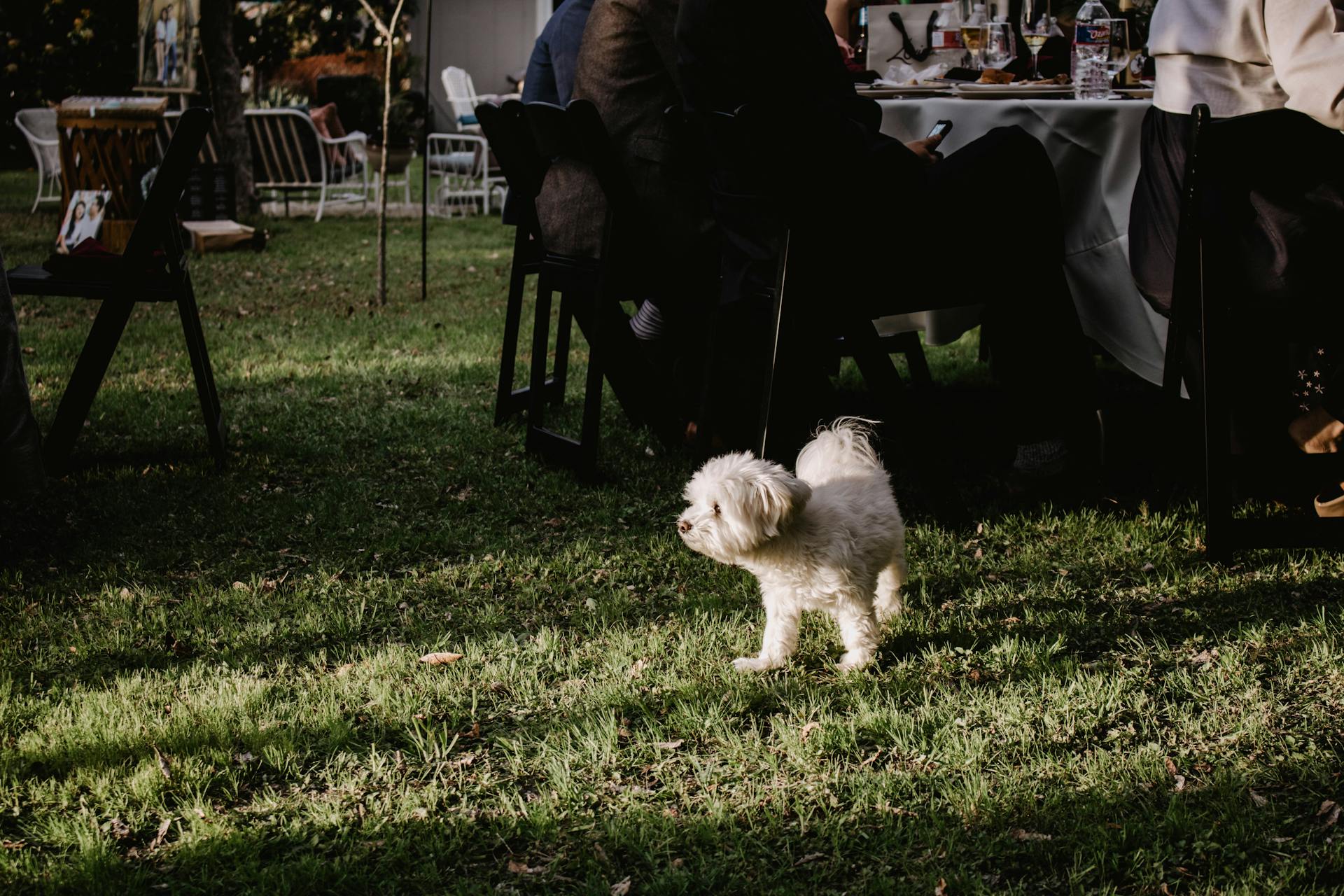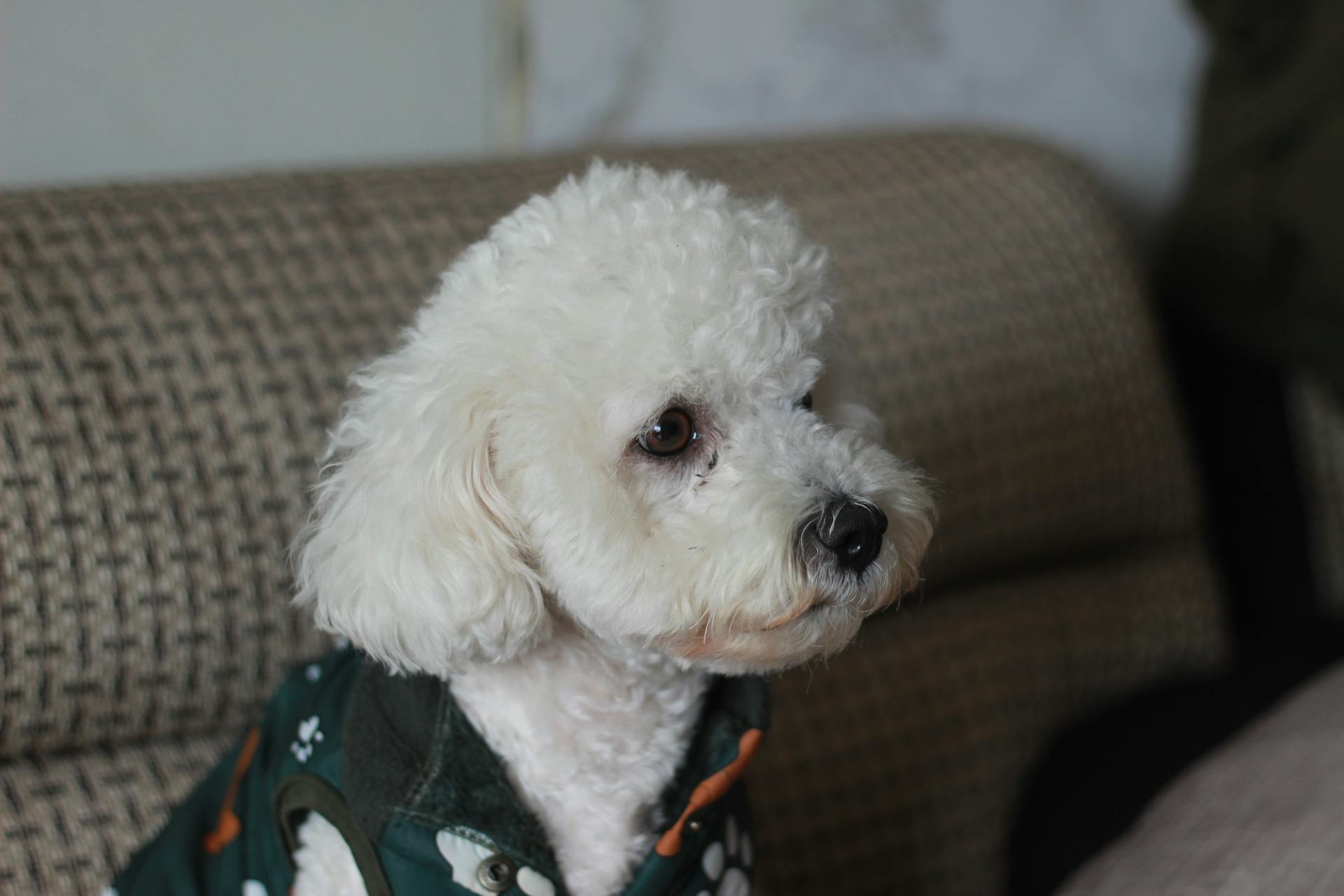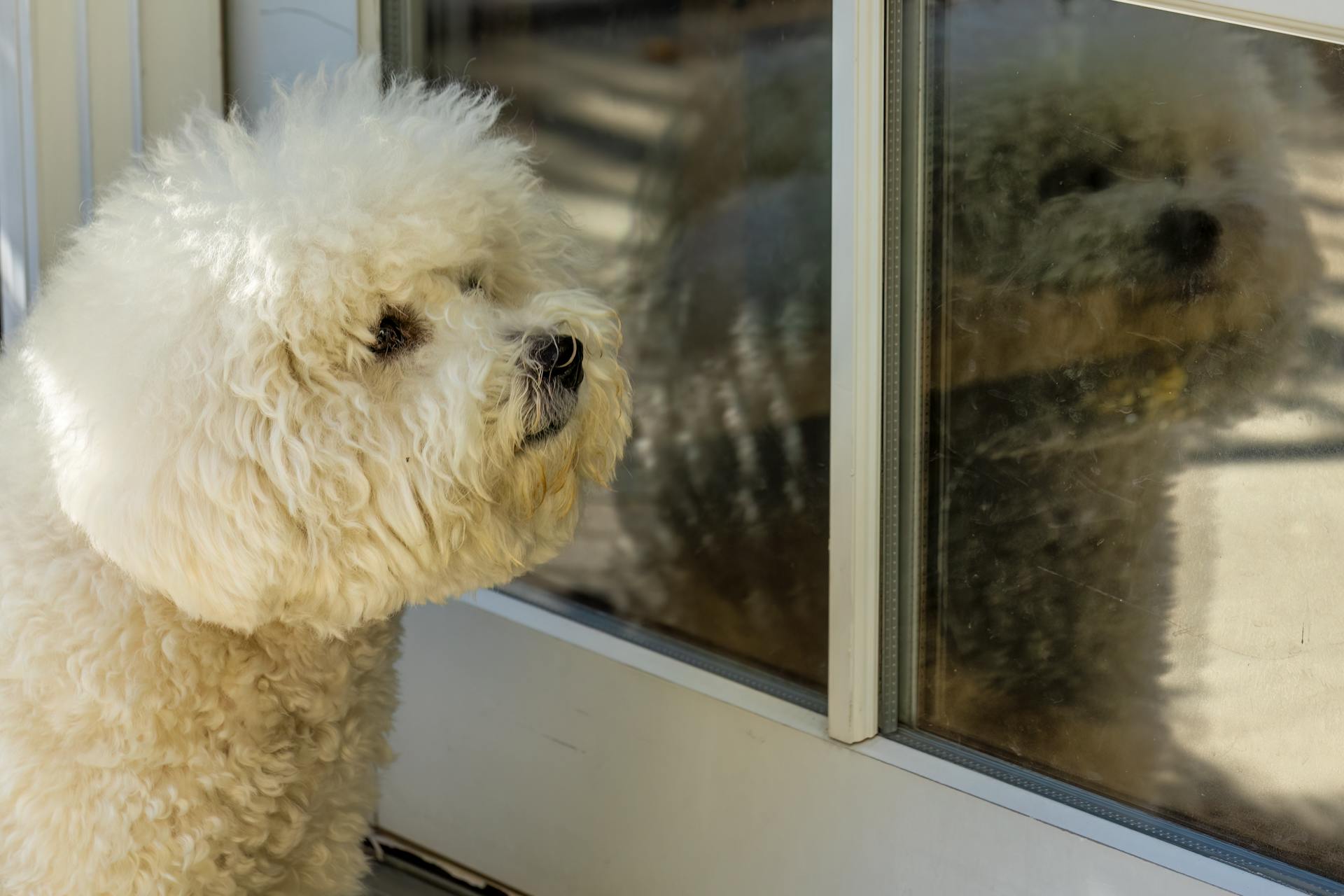
The Bichon Frise is a small, fluffy dog that's often considered a great companion for city living. They are adaptable to small spaces and require moderate exercise.
One thing to consider is their grooming needs. Bichon Frises require regular grooming to prevent matting and tangling of their fur, which can be time-consuming and expensive.
Their friendly and outgoing personalities make them a great fit for families with children. Bichon Frises are also known for being gentle and even-tempered.
However, they can be prone to separation anxiety if left alone for long periods. Regular exercise and mental stimulation can help alleviate this issue.
Related reading: Great Pyrenees Puppy Care
Temperament and Intelligence
The Bichon Frise is a confident, friendly canine that thrives on human interaction. They're naturally curious and love to be around people, which makes them excellent companions.
These dogs are known for their playful, friendly nature, and they can make great watchdogs due to their alertness. However, they're not guard dogs by any means.
Bichon Frises are highly people-oriented and love to snuggle with their owners. In fact, they can be prone to separation anxiety if left alone for too long.
Their confidence is oversized, considering their small stature, and they're not easily intimidated by strangers. They're natural performers and love to put on a show for their family.
Early socialization is key to raising an outgoing Bichon Frise, as some bloodlines can exhibit shyness. With proper training and attention, they'll be eager to learn tricks and entertain their owners.
See what others are reading: Are Bichon Frise Good for First Time Owners
Family and Pet Compatibility
Bichon Frises are often a good match for households with multiple pets.
The breed is known for being one of the friendliest pups out there, and this friendliness extends to other animals in the home. No matter what type of other pets you have, a Bichon Frise should be able to get along with them.
Early socialization is best, but even if you're introducing a Bichon Frise to your home later in life, as long as you go slowly with introductions, things should be fine.
A different take: Obedience Training for Pitbull Puppies
Bichon Frises are wonderful with children, as long as the children treat the dog with care and the dog is properly socialized. They're sturdier than many small breed dogs, but rough play should not be allowed to prevent injury to both the dog and child.
The Bichon Frise is a fantastic pet for families, and their smaller size means you don't have to worry about a child accidentally getting knocked down by them.
Exercise
Bichon Frises are moderately active dogs, so they need regular exercise to stay happy and healthy. They're perfect for owners who enjoy playing with their pets and engaging in fun activities together.
You can expect your Bichon Frise to have long periods of calm, but these will be broken up by energetic bursts of playfulness. This is completely normal, and it's actually a great thing - it means they're full of energy and ready to play.
A daily exercise routine of about 45 minutes is a good starting point. This should include a mix of walks and playtime, and you may even want to consider signing them up for obedience and agility classes. Many Bichon Frises love competing in these types of activities.
If you do decide to take your Bichon Frise for a walk, make sure you're in a safe, enclosed area before taking them off their leash. They're fast, and it can be challenging to catch them if they get loose.
In any living situation, from apartments in the city to sprawling country estates, Bichons get along just fine as long as their owners are ready to have some fun. They need at least 30 minutes of daily activity, whether that's a quick walk, a jaunt through the backyard, or a fun race around the house.
If you do opt for outdoor play, make sure you're inside a fenced area. Bichons are small, but extremely quick, and can be difficult to catch if they get loose.
Grooming and Care
Bichons require regular grooming to prevent matting and keep their coats looking their best. Brushing should be done at least three times a week, but daily is ideal.
To maintain your bichon's coat, you'll need to brush their soft double coat regularly, trim their nails monthly, and inspect their ears for overgrowth. You should also check their eyes regularly to ensure their eyelashes aren't growing into the pupil.
Here are some essential grooming tasks to perform on your bichon:
- Brush their coat at least three times a week, ideally daily
- Trim their nails monthly
- Inspect their ears regularly for overgrowth
- Check their eyes regularly to ensure their eyelashes aren't growing into the pupil
In addition to grooming, regular dental care is crucial to prevent tooth problems. Brush your bichon's teeth daily with dog-friendly toothpaste, and schedule an annual dental exam and cleaning with your vet.
Grooming
Grooming is a crucial part of caring for your Bichon Frise. You'll need to brush their coat daily to prevent matting, but two to three times a week is sufficient if daily brushing isn't feasible.
Bichon Frises have a low-shedding coat, but it still requires regular maintenance to prevent matting. Mats can cause hematomas, which collect blood in one spot and clot.
Brushing your Bichon's teeth regularly is vital to prevent dental disease. You should brush their teeth daily with dog-friendly toothpaste to minimize dental problems.
Related reading: Brushing a Bichon Frise
Trimming your Bichon's nails is essential to prevent overgrowth. You should trim their nails once a month or more frequently if they're not being naturally worn down from daily walks.
A good groomer who is familiar with Bichon Frisé styling can help you achieve the breed's distinctive coat shape. However, you can also learn to clip your own dog if you have the time to learn proper technique.
Here's a summary of grooming tasks to consider:
- Brush coat daily or two to three times a week
- Trim nails once a month or more frequently
- Brush teeth daily with dog-friendly toothpaste
- Clip coat with a good groomer or learn to do it yourself
Regular grooming will help keep your Bichon Frise looking and feeling their best.
Caring for Frisé Hair
Bichon frisés have a double coat that requires regular grooming to prevent matting and tangling. Their fur needs to be brushed daily to prevent knots.
Their fur also requires regular bathing, ideally every 2-3 weeks, to keep it clean and healthy.
Training and Behavior
Bichons are easy to train and take quickly to new tricks when taught with patience, kindness, and positive reinforcement.
Their friendly and outgoing nature makes them highly people-oriented, which can sometimes lead to separation anxiety if left alone for too long.
In fact, they love making their humans happy, so they'll enjoy learning tricks and putting on a show for the family.
Intelligence
The Bichon Frise is a highly people-oriented breed, which means they thrive on interaction with their human family. They love being around people and animals, and will often go out of their way to make new friends.
These dogs are entertainers at heart, and will put on a show for their family with ease. They're open to learning tricks and will enjoy performing for treats and praise.
Their intelligence is one of their most charming qualities, and they're quick to pick up on commands and behaviors. With positive reinforcement and patience, they can learn to do just about anything.
One thing to keep in mind is that Bichon Frises can be prone to separation anxiety, so they'll need regular exercise and mental stimulation to prevent boredom and destructive behavior.
Expand your knowledge: Are German Shepards Good Dogs
Training Your
Training Your Bichon Frise is a breeze, especially if you start early. Begin training your Bichon Frise extremely early.
Bichons are highly intelligent, making them easy to train in practically everything except for house training. They take quickly to new tricks when taught with patience and kindness.
Positive reinforcement is key when training a Bichon Frise. Use only positive reinforcement to avoid any issues.
Your Bichon Frise will love making you happy with their new tricks. Learning and performing tricks is a pastime for Bichons.
With patience and positive reinforcement, your Bichon Frise will take to new tricks in no time. They'll even enjoy learning and performing for you.
Some Bichon owners even engage in obedience, agility, and rally competitions. If you're a volunteer at heart, your Bichon might be perfect for therapy dog visits to hospitals and nursing homes.
Their gentle nature makes them well-suited for therapy dog visits.
Do Dogs Bark Often?
Dogs bark often, and it's usually for a good reason. Bichons, for example, will bark to alert you if someone they haven't met is at the door.
Some breeds are naturally more vocal than others. Bichons are lovers, not fighters, but they will bark to alert you if someone they haven't met is at the door.
Dogs bark for various reasons, including alerting their owners to potential threats. A Bichon's bark can be a warning sign that someone they don't know is approaching.
Barking can be a challenge to manage, but understanding the underlying reasons can help. Bichons, in particular, tend to be more alert and vocal than some other breeds.
In some cases, dogs may bark due to anxiety or excitement. A Bichon's bark can be a sign that they're feeling anxious or alert.
Breed Overview and History
The Bichon Frise is a wonderful breed that's perfect for families, people who stay at home a lot, singles, and seniors alike. They're loving, playful, intelligent, and affectionate, making them a great addition to most households.
These dogs have a storied history, having been circus dogs at one point, and have been charming people for centuries. They're known to be people-oriented and highly entertaining, which is why they're a favorite among many.
The Bichon Frise's origins are believed to be in the Mediterranean, and they were brought to Tenerife in the Canary Islands by Spanish sailors. They quickly became popular there, but were known as the Bichon Tenerife at the time.
Breed Overview
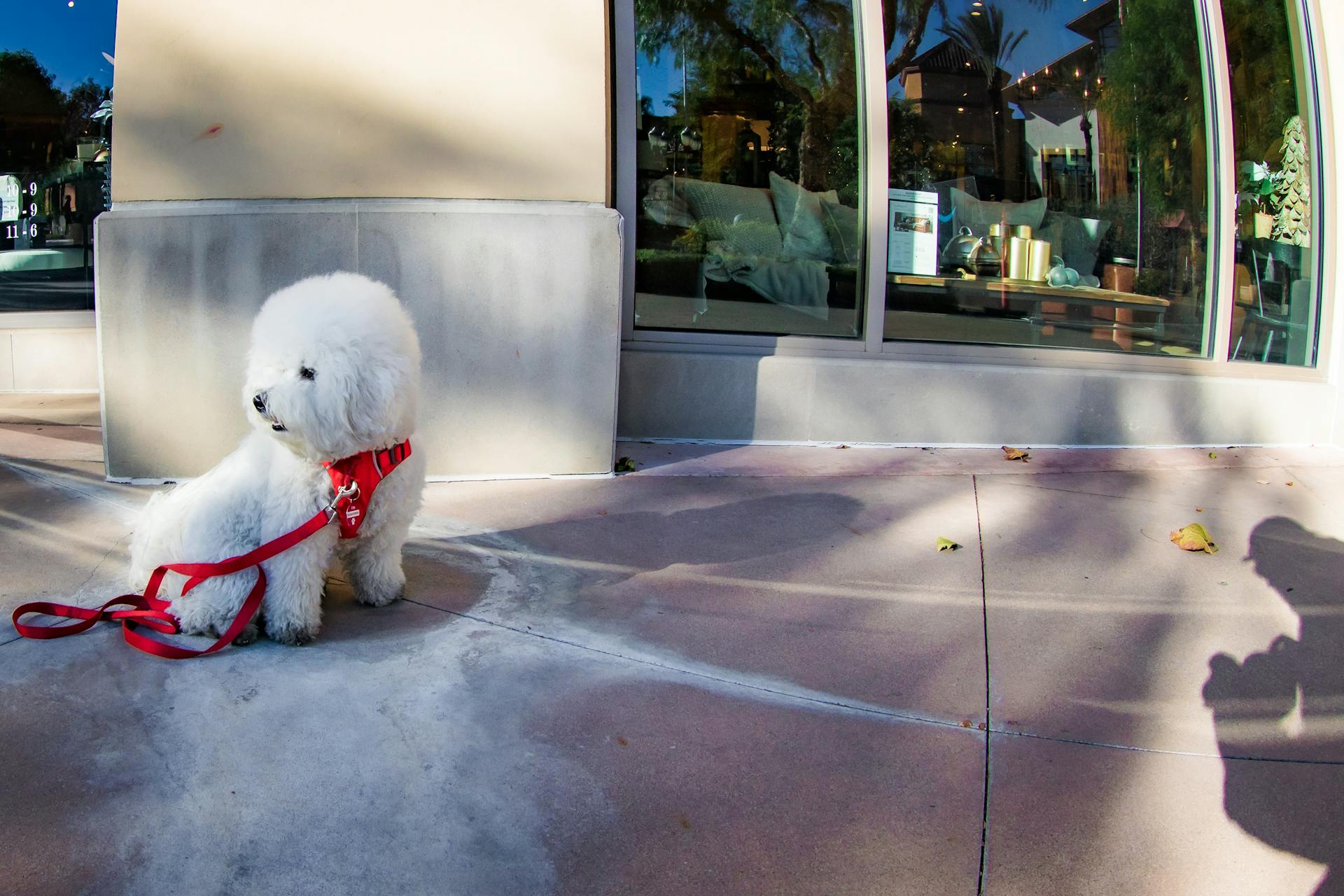
The Bichon Frise is a people-oriented breed that thrives on human interaction. They're perfect for families, singles, seniors, and anyone who stays at home a lot.
This breed has a storied history, having been circus dogs at one point. They're known for being highly entertaining and loving the center of attention.
Bichon Frises are intelligent and playful, making them a joy to be around. They have a long, soft, and curly double coat that requires regular grooming.
Here are some key characteristics of the Bichon Frise breed:
- Height: 9.5 to 11.5 inches
- Weight: 12 to 18 pounds
- Coat length & texture: Long, soft, and curly double coat
- Coat color: Traditionally all white, but can also have splashes of apricot, buff, and cream
Their exercise needs are regular, and they require a lot of attention and interaction to stay happy and healthy.
History & Origins
The Bichon Frise has a long and fascinating history. Its origins are believed to be somewhere in the Mediterranean.
The Bichon Frise was brought to Tenerife in the Canary Islands by Spanish sailors, where it became incredibly popular and was known as the Bichon Tenerife.
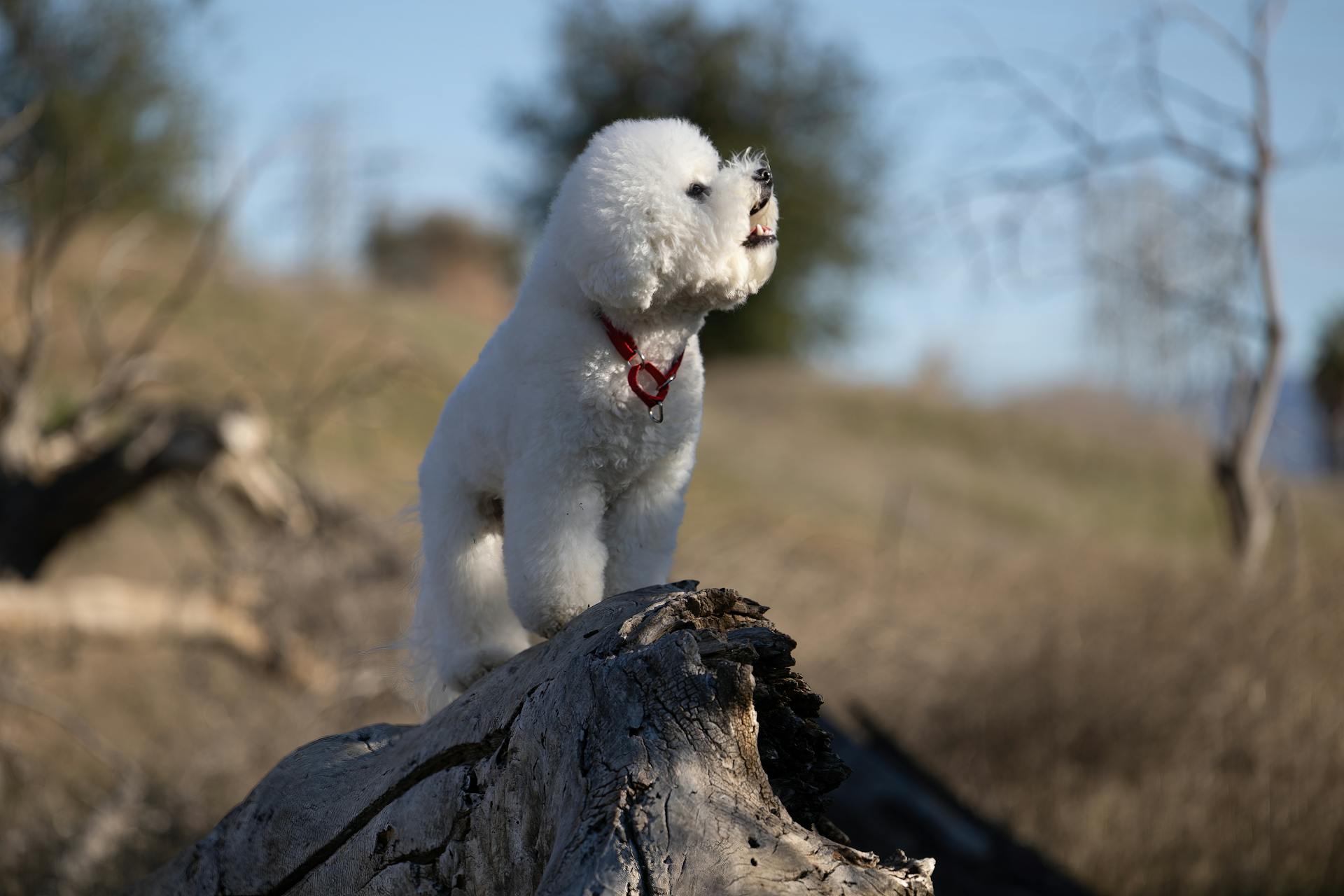
These dogs made their way to Europe via Italian sailors in the 14th century.
In Europe, the Bichon Frise quickly became a favorite of nobility and royalty, particularly in Italy, France, and Spain.
The breed's popularity was short-lived, however, as the French Revolution led to many of its owners being imprisoned or executed, leaving the Bichon Frise on the streets.
On the streets, the Bichon Frise thrived as they were highly intelligent and capable of being trained to do tricks, making them a hit with street entertainers, organ grinders, and the circus.
The two world wars also posed a challenge for the Bichon Frise, but fortunately, some breeders gathered a few of these canines off the streets and began breeding them, ensuring the breed's survival.
By the 1930s, the Bichon Tenerife was known as the Bichon Frison and was acknowledged as a show dog.
The Bichon Frise eventually made its way to the U.S. in 1956, where it was recognized by the American Kennel Club (AKC) in 1972.
Discover more: Dr Gary's Best Breed Puppy
3 Little-Known Frise Facts
The Bichon Frise is a delightful breed with a rich history.
They originated in the Mediterranean region, specifically in the island of Tenerife in the Canary Islands.
The name "Bichon" is believed to come from the French word "bichon", which means "small dog."
One interesting fact about the Bichon Frise is that they were originally bred as companions for royalty and nobility.
Their small size and gentle nature made them a favorite among the aristocracy.
The Bichon Frise is a low-shedding breed, which makes them a great choice for people with allergies.
They require regular grooming to prevent matting and tangling of their fur.
Breed Similar to Frisé
If you're considering a bichon frisé but not sure if it's the right fit, there are several breeds worth exploring. The Coton de Tulear is one option, known for being witty, clownish, and lighthearted, with a similar size and demeanor to the bichon but without the high grooming costs.
The Coton de Tulear is also sometimes referred to as the "Royal dog of Madagascar." Its grooming needs are relatively low, making it a great alternative to the bichon frisé.
Chow Chows are another breed to consider, with a history dating back to China's Han Dynasty around 206 b.c. They're known for being easy to housebreak and having very little odor, making them a great choice for those who want a low-maintenance pet.
Chow Chows also have a unique tongue that sets them apart from other breeds. They're often described as dignified and make great companions for those who want a calm and collected pet.
Newfoundland dogs are a great option for families, as they're known for being gentle and friendly with kids and other dogs. They're also highly trainable and incredibly patient, making them a great choice for first-time dog owners.
Here are a few breeds similar to the bichon frisé:
- Coton de Tulear
- Chow Chow
- Newfoundland
Final Thoughts
The Bichon Frise is a fantastic addition to any household, thriving in homes with people around most of the time.
They love being around their people, are outgoing and friendly, and love to entertain, making them a great companion for families or singles alike.
However, they can be prone to separation anxiety, so if you're away from home a lot, you might want to consider a different breed.
If you do decide to bring a Bichon Frise into your home, you'll have a friend for life - and they'll likely be by your side most of the time.
Frequently Asked Questions
Are Bichon Frises high maintenance?
Yes, Bichon Frises are considered high maintenance due to their frequent grooming needs. Regular bathing and coat maintenance are essential to keep them clean and happy.
Do Bichon Frise bark a lot?
Bichon Frises are generally quiet dogs and don't bark excessively, making them a great choice for city living. However, their low barking nature also means they're not effective watchdogs.
Can a Bichon Frise be left alone?
Bichon Frises can be left alone for short periods, but ideally no more than 4 hours, and ideally not exceeding 6-8 hours a day to prevent anxiety and frustration. Regular breaks and social interaction are essential for their well-being.
Do bichons like to be cuddled?
Bichon Frises are extremely affectionate and love to cuddle, making them perfect companions for snugglers. They thrive on physical affection and will often seek out cuddles from their family members.
Featured Images: pexels.com
